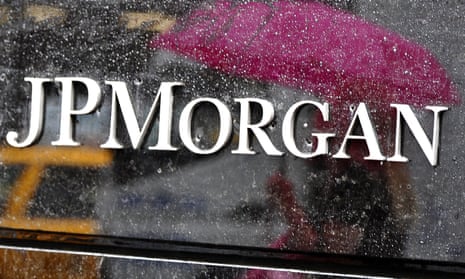One of the world’s largest banks, JP Morgan, is preparing for a potential surge in defaults by borrowers as households face pressure from high inflation and ever-climbing interest rates.
The Wall Street bank put aside $1.7bn (£1.3bn) for credit losses between April and June, according to its latest financial report, marking a 54% jump from a year earlier, when provisions totalled $1.1bn.
It follows a rise in the number of customers falling behind on their credit card payments to levels seen before the pandemic.
JP Morgan is the first big US lender to increase the money put aside for defaults, as households face pressure from high inflation and ever-climbing interest rates, which the US Federal Reserve has set at a range of 5% to 5.25%.
However, the rising rates contributed to a rise in JP Morgan’s profits, which jumped 40% to $13.3bn as borrowers were charged more on their debts.
The bank’s chief executive, Jamie Dimon, cheered its “strong” second-quarter results and said nearly every division experienced growth. But while the US economy was resilient, he flagged concerns over a continued slowdown in consumer spending.
“There are still salient risks in the immediate view,” Dimon said. “Consumers are slowly using up their cash buffers, core inflation has been stubbornly high – increasing the risk that interest rates go higher, and stay higher for longer – quantitative tightening of this scale has never occurred, fiscal deficits are large, and the war in Ukraine continues.”
He added: “While we cannot predict with any certainty how these factors will play out, we are currently managing the firm to reliably meet the needs of our customers and clients in all environments.”
Dimon’s bank already weathered the mini-banking crisis that led to the collapse of three US lenders earlier this year. JP Morgan bought embattled regional bank First Republic in May, as part of a government auction meant to stem market panic that was spreading across the global financial sector.
after newsletter promotion
JP Morgan said the takeover of First Republic led to a “bargain purchase gain” of $2.7bn in the second quarter, bumping the lenders’ total profits up 67% to $14.4bn.
But the buyout also meant taking on some added risks. JP Morgan’s credit loss provisions nearly tripled to $2.9bn in the quarter, including First Republic’s debts.









